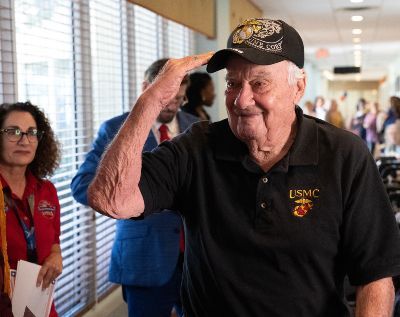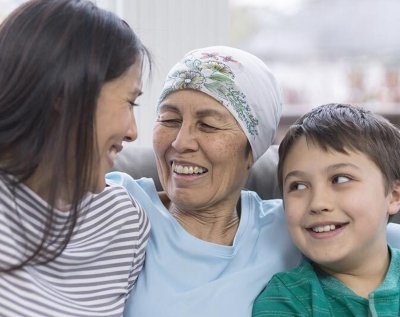Bringing Veteran Patients Peace Near the End of Life with Advanced PTSD Therapies
By Larry Hetu-Robert, M.Div, Bereavement Services Manager and Veterans Liaison, VITAS Healthcare
Managing post-traumatic stress disorder (PTSD) can be particularly challenging for veterans, affecting their relationships and overall quality of life, including their experiences as they near the end of life. While medical advances have significantly improved the clinical care for those who have served our country, the silent wounds of war often require innovative solutions centered on empathy.
One recent study designed to determine the rates of and variables associated with PTSD-related distress near the end of life found almost one in 10 (8.9%) veteran decedents experienced PTSD-related distress. The same study also found that high overall medical comorbidity, dementia, and psychiatric comorbidities, including both substance use disorder and depression, were also associated with PTSD-related distress at the end of life. Palliative care consultation and emotional support were associated with decreased odds of PTSD-related distress, while pain was associated with increased odds of PTSD-related distress at the end of life.1
In addition to first-line pharmacologic and non-pharmacological approaches, the field of PTSD therapy has seen the emergence of new and innovative treatments used in conjunction with traditional therapies that aim to alleviate the symptoms and help veterans lead more fulfilling lives.
Healing With Animal-Assisted Therapy
Animal-assisted therapy has shown remarkable efficacy in aiding veterans with PTSD. Programs that encourage animal interaction have demonstrated how these experiences, whether through service dogs or equine therapy, can reduce anxiety and pain while providing a safe and comforting emotional connection.2
Service dogs, for instance, have been trained to identify when veterans experience nightmares or flashbacks, offering them a way to refocus and find solace in the companionship of their loyal canine friends. Equine therapy, on the other hand, encourages veterans to build a mutual relationship of respect and trust with horses, helping them develop valuable coping skills and reduce anxiety.
The power of these interactions extends to veterans nearing the end of life. VITAS Paw Pals® can offer comfort, reduce anxiety, and provide a sense of connection and intimacy, reminding veterans that they are loved and appreciated.
Virtual Reality Therapy
Virtual reality (VR) therapy, particularly when used in prolonged exposure (PE) therapy, has shown great promise in treating PTSD. VR therapy has played a vital role in enabling veterans to confront and make peace with their past.
Related: VITAS Healthcare Offers Atlanta's First Virtual Reality Honor Flight
Psychoactive Medications and CBT: Resetting the Trauma Response
Pharmacological management of PTSD is gaining popularity, with substances like MDMA, ketamine, and psilocybin showing efficacy in targeting and decreasing fear and anxiety pathways in the brain. Administered in a controlled therapeutic setting, these medications have been shown to help reset and rewire the brain's response to traumatic memories, providing veterans with a path toward healing and recovery.
However, there are major legal, ethical, and financial barriers to access that exist for the general population; obstacles which are likely worsened for geriatric and seriously ill patients.
As the medical community gathers data about the efficacy of psychoactive PTSD treatments, VITAS Healthcare continues to connect veterans with evidence-based treatments for PTSD. VITAS physicians incorporate cognitive behavioral therapy, SSRIs, and veterans’ social support groups—among other tools—to help their veteran patients process and heal at the end of life.
Moral Injury: A Complex Result of Arduous Service
Addressing PTSD in veterans near the end of life involves a holistic approach. Beyond managing symptoms, we must also recognize the concept of moral injury, a violation of deeply held moral beliefs that can lead to extreme feelings of guilt and shame. This aspect of trauma emphasizes the social, cultural, and spiritual dimensions of the veterans' experiences.
Moral injury is a profound and often overlooked aspect of veterans' trauma. It can lead to a loss of faith, self-deprecating emotions, and struggles with self-worth, which may persist even during the final stages of life. At this critical stage, hospice can make a positive impact by fostering an environment of forgiveness and compassion.
VITAS teams understand that veterans' needs go beyond standard care. Our approach involves education, recognition, and fostering an environment of appreciation, gratitude, enhanced coping skills, and support for spiritual growth. This means recognizing veterans at the time of admission, assisting them with accessing their VA benefits, and understanding their unique experiences.
The Benefits of Hospice Care
For veterans nearing the end of life, hospice care offers 24/7 access to clinical and psychosocial support. Whether through nurses, social workers, chaplains, or volunteers, hospice care ensures that veterans receive the personal attention and support they need. In many cases, veteran-to-veteran volunteers can offer a unique level of understanding and companionship.
Hospice care, being an intimate form of care, allows providers to identify and address emotional and psychological needs, which are especially crucial for veterans. This level of personalized care ensures that veterans receive the comfort and support they deserve as they face the end of life.
Tips for Healthcare Professionals Caring for Veteran Patients With PTSD
To ensure veterans access VA benefits and hospice services effectively, it is crucial for healthcare professionals to understand the unique needs of veterans, especially those with PTSD.
Additionally, understanding the steps for veterans to access VA benefits is vital. Veterans should enroll in the VA Healthcare system by visiting VA.gov or calling 877-222-8387 and selecting option #1. Healthcare professionals can assist in this process and guide veterans to their state veteran service organizations for additional support.
The evolving landscape of PTSD therapy and the growing focus on moral injury underscore the importance of providing holistic and veteran-specific care to our nation’s heroes. With compassion, innovation, and commitment, we can help veterans lead lives marked by purpose, meaning, and, ultimately, peace.
Clinicians with veteran patients facing PTSD should consider a hospice provider who approaches veteran care by looking at the entire journey of every individual’s life. Factors such as the war or conflict they served in, their age when they volunteered or were drafted, and their rank provide insight into the best ways to approach caring for each patient. By asking the right questions and fostering compassionate communication, we can better understand the needs of veterans, especially those with PTSD, and provide tailored care.
1Kaiser, et al. (2023). Factors Associated With Distress Related to Posttraumatic Stress Disorder at the End of Life Among US Veterans. Journal of Pain and Symptom Management.
2O’Haire, M. E., Guérin, N. A., & Kirkham, A. C. (2015). Animal-assisted intervention for trauma: A systematic literature review. Frontiers in Psychology, 6.

The VITAS Advantage
By choosing VITAS for your hospice and palliative care needs, you, your patients or residents, and their families realize benefits that other providers cannot offer.
Learn More
